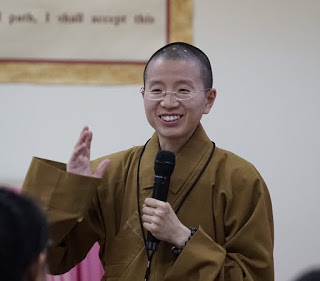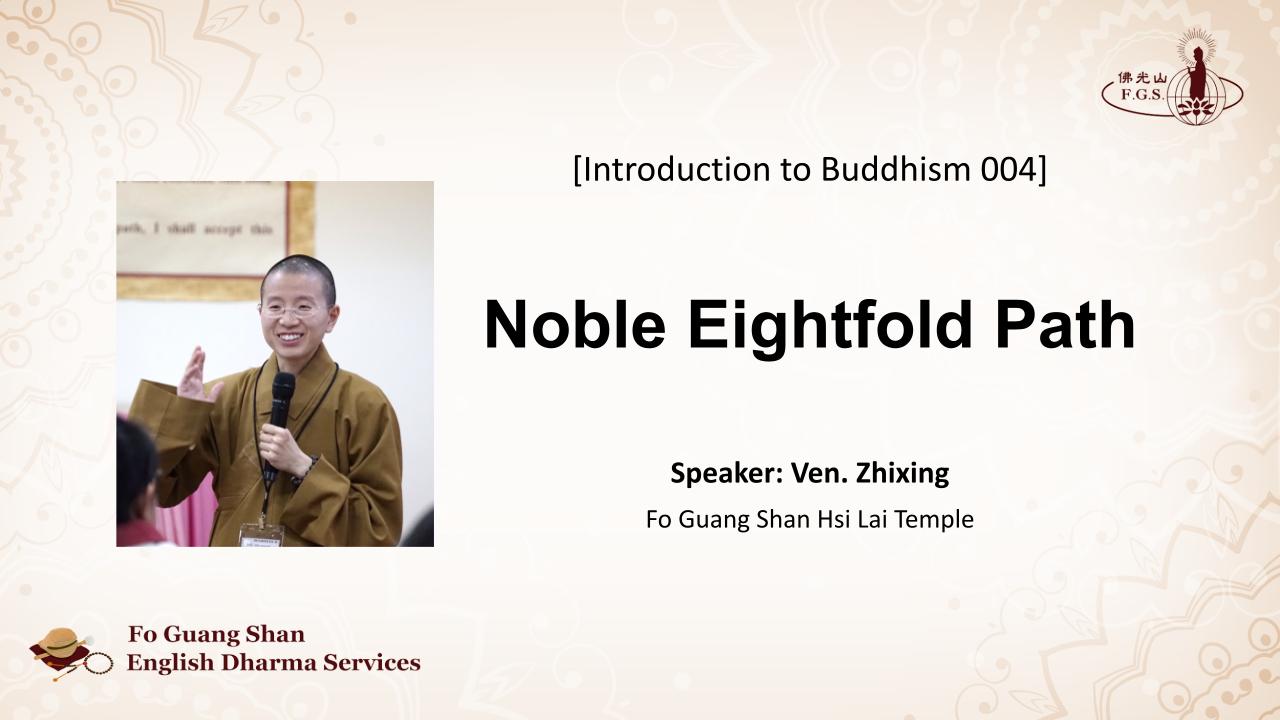
Speaker: Venerable Zhixing
Fo Guang Shan Hsi Lai Temple, Los Angeles
I. Recap: Four Noble Truths
Auspicious greeting to all friends from around the World! This is Venerable Zhixing from Fo Guang Shan Hsi Lai Temple in Los Angeles, United States. Thank you for joining our online English Dharma service. It is nice to share the Dharma with you all again.
The heart of the Buddha’s teaching is the Four Noble Truths:(1) suffering, (2) causes of suffering, (3) cessation of suffering, and (4) path to cessation of suffering. We have various problems or we encounter different hardships or obstacle in our life, and all these problems and hardships give us lots of defilement and suffering. How can we eradicate these sufferings?
II. Noble Eightfold Path
The Buddha had taught us to practice the Noble Eightfold Path. It provided a clear guide and practical instructions that lead us to attainment of Buddhahood and liberation from sufferings. It is also a path that had been practiced by all the Buddhas in the past. It then begs the question of what is the Noble Eightfold Path and how do we practice it in our life?
The Noble Eightfold Path are:
(1) Right view
(2) Right intention
(3) Right speech
(4) Right action
(5) Right livelihood
(6) Right effort
(7) Right mindfulness
(8) Right concentration
These eight are not steps for us to practice them in sequence, one after another. Rather, we practice all of them together in our daily life, sort of like the intertwining wire in a cable, which requires the contributions of all wire in order for the cable to work.
Let us look at what each of these factors is.
III. Right View
Right view is the forerunner and guide of the entire path. It ensures that we are on the right path. It serves as a compass for us in the path. Why is right view being placed first on this path? Our view affects our action and the decision that we make.
Once, there is a superstitious lady. When she bought a house, she had invited a Feng Shui Master to take a look at the house to see if everything is okay. The Feng Shui Master told her there were three ghosts living in the house. At night, when she lived in the house alone, all that she could think of was there were three ghosts in the house with her.

She became very scared and filled with paranoia. Ultimately, she couldn’t take it anymore and bought another house. She invited the Feng Shui Master again to look at her new house. The master told her that the new house had a very negative atmosphere. The lady became more depressed each day, and ultimately committed suicide.
From the story, we can see that our view on people and things affect us a lot. Having negative and wrong view will lead us to more suffering and sometime doing things that we regret. This is why it is important for us to have the right view. With right view, our action, speech and thoughts would be righteous and wholesome as well.
Right view involves a correct understanding of the Buddha’s teaching. We should know that all phenomena arise from causes and conditions. Causes, given the required conditions, will produce the corresponding effects. We reap what we sow. Thus, if we do good deeds, we will have good effect. On the other hand, if we do bad deeds, we will have negative consequences. Whatever that we do, or speak, or think, there will be karma. We should also keep in mind that all phenomena are impermanence, meaning they are changing all the time.
Currently, various countries around the world are still facing the COVID-19 pandemic, how should we face it? We should accept that it is the current causes and conditions. However, we should also know that it will come to pass. Causes and conditions are changing all the time. Scientists and medical researchers are working hard to create the vaccine. If everyone can wear face mask, keep a 6-ft social distance, and try to stay at home whenever possible, then the transmission of the virus can be under controlled and the chance of people catching the virus will decrease. We are all interdependent, thus by being compassionate to others, we are being compassionate to ourselves as well. We are helping ourselves by helping others.
IV. Right Intention
Right Intention is also known as right thought. It is about having a mind free from greed, anger and ignorance. The Buddha explained the right intention as threefold: (1) the intention of renunciation, (2) the intention of good will, and (3) the intention of harmlessness.
i. Intention of renunciation
We know that desires is one of the root causes of suffering. Because of this, we would want to let go of our craving. This give rise to intention of renunciation.
ii. Intention of good will
When we see that, like ourselves, all other living beings want to be happy, and that they are subjected to suffering, it will inspire us to have loving kindness and compassion to others. The consideration that all beings seek happiness give rise to thoughts of good will—the loving wish that they would be well, happy, and peaceful.
iii. Intention of harmlessness
The consideration that beings are exposed to suffering give rise to thoughts of harmlessness—the compassionate wish that they would be free from suffering.
In the pandemic, we should learn to let go the desire to go out to gather with friends and family or the desires to dine out or shop. This is being considerate of others and compassionate to them. We hope that everyone will be healthy, safe and free from suffering. We can do that by doing our part and also dedicate our merit back to everyone every day, wishing that the pandemic will end soon and everyone will be healthy and safe.
V. Right Speech
Right Speech is about abstaining from false speech, slanderous speech, harsh speech, and idle chatter. We should speak words that are true and free of delusion. As the ancient sage told us, “Disaster arises from the mouth.” It’s telling us that speech can cause conflict, harms to others and create enemy.

In the current time with so much chaos and uncertainly, we should give words of encouragement and positivity to others. Those with COVID-19 are quarantined at home. Thus, they are sick, lonely and filled with fear. This combination tends to lead one to think negatively. Therefore, they need words of encouragement and support even more than ever.
VI. Right Action
Right Action is about refraining from killing, stealing, and sexual misconduct. Instead, we should always do wholesome deeds. In the time of pandemic, we should wear face mask, keep social distancing and wash our hands frequently. We can donate food to food drive for those in need. We can help seniors to do grocery shopping and so on.
VII. Right Livelihood
Right livelihood is about earning a living and supporting oneself through proper means. We should abstain from making a living through a profession that brings harms to others.

During the pandemic, if one has a job as an essential worker such as medical professionals, police, fire fighters, staff at grocery stores and so on, one works with care and does their best at work.
VIII. Right Effort
Right effort is also known as right diligent. It is about:
(1) Preventing the arising of unwholesome thoughts that have not arisen;
(2) Abandoning unwholesome thoughts that have already arisen;
(3) Giving rise of wholesome thoughts that have not yet arisen;
(4) Maintaining and increasing the wholesome thoughts that have already arisen.

Basically, it’s about having wholesome thoughts every single moment. Facing with so much negativity in our life, we need to remind ourselves to change perspective and think positive. Because things are changing, there will always be hope. May be our life is not going according to plan due to the pandemic, but things are uncertain. Crisis and suffering can be the beginning of an opportunity and a chance to gain insight. Just like the beautiful and pure lotus is grown from mud. We gain insight through suffering. We have to remind ourselves to be positive all the time.
IX. Right Mindfulness
Right Mindfulness is being diligently aware, mindful, and attentive with regard to our body, feelings, activities of mind and mental qualities such as ideas, thoughts, conceptions and so on. It is important for us to maintain right mindfulness at all time, so that we can be aware of any thoughts and feelings that arise. Only if we are aware of the thoughts and feeling that arise would we be able to make the right choice of action and speech as action and speech arise from the mind.
In time of pandemic, when we want to go out to do grocery shopping, we would notice that we need to be very mindful at all time. We need to wear our face mask, refrain from touching our face, wear a pair of gloves, and bring alcohol spray with us. We go into the grocery store and do our shopping, during which we need to be mindful in maintaining a 6-ft distance with others, and refrain from touching too many different things. Once we are done, we would open our car door with a piece of tissue and put the grocery bags in the car. We would need to carefully take off the gloves without touching the surface of the gloves after we sit in the car. Finally, wash our hand with sanitizer before driving home. Without being mindful, we might bring the virus home with us without knowing it.

X. Right Concentration
Right concentration is using samadhi to focus the mind and settle the distracted body so we can better cultivate ourselves. Samadhi is exclusively wholesome one-pointedness, the concentration in a wholesome state of mind. Ultimately, cultivating right meditative concentration will reveal our Buddha nature to us and allow us to discover our true self. We can develop concentration and sense of mindfulness through practicing meditation. This is also why meditation is an important Buddhist practice.
As we have many stresses and defilement in life, we should take some time to meditate every day. We may think that we are very busy and it’s hard to find time to meditate. In such case, you can start with something manageable such as just sit and focus on your breath for 5-10 minutes before you go to bed or after you wake up in the morning. As you meditate, just focus on your breath. Even though you may have lots of thoughts in your mind, just be aware that they are there and that they disappear. However, put all your attention on your breathing. By giving ourselves this quiet time, we would be able to train our sense of mindfulness and become more aware of the thoughts and feelings inside us.

This is especially important for us during the pandemic. As we are forced to change our way of life and deal with lots of inconvenience, frustration, agitation, anger, depression and fear easily arise and overwhelm us. Observing these thoughts and feelings without responding to them during meditation will help us in working with these feelings and help ourselves in changing perspective.
XI. Conclusion
The Noble Eightfold path – Right View, Right Intention, Right Speech, right action, right livelihood, right effort, right mindfulness and right concentration is a path that would lead us to happiness and ending of suffering. This path is not a theory, but a practice that we should all take up and cultivate in our daily life. If we just listen to the teaching without practicing it, this teaching would not help us at all. Hopefully, everyone would take some time to contemplate upon how one can apply the Noble Eightfold Path in life and really practice it.
Last, but not least, thank you for joining us in this cultivation session. May Buddhas and Bodhisattvas bless everyone with happiness and peace. May everyone be safe and well. Amitofo.
Read more about Noble Eightfold Path!
Buddha-Dharma: Pure and Simple 1

In today’s Buddhist sphere, numerous claims have been made on what the Buddha has taught. However, were they truly spoken by the Buddha? The Buddha-Dharma: Pure and Simple series is an exploration of over 300 topics, where Venerable Master Hsing Yun clarifies the Buddha’s teachings in a way that is accessible and relevant to modern readers. Erroneous Buddhist views should be corrected, the true meaning of the Dharma must be preserved in order to hold true to the original intents of the Buddha.
Published by: Fo Guang Shan Institute of Humanistic Buddhism
Read it here

